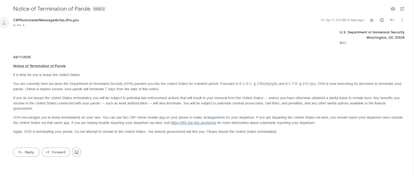Last weekend, immigration attorney Liudmila Armas Marcelo spent her time not just listening to — but above all, calming — many of her desperate clients who had received orders to leave the United States within seven days. Her phone rang nonstop. On the other end were people on the brink of a breakdown. One client’s blood pressure skyrocketed. Another’s son, who suffers from health issues, was severely affected. “People panicked,” Marcelo recalls.
What she never expected was that she, a U.S. citizen, would also be notified by the Department of Homeland Security (DHS) to leave the country “immediately.”
On April 11, she received the same email that had been landing in the inboxes of over 936,500 people who entered the U.S. since January 2023 via the CBP One appointment system — a tool introduced by the Biden administration to help manage the migration crisis at the southern border. It’s a message that could rattle anyone — citizen or not — with a tone Marcelo describes as “very aggressive and very frightening.”

The DHS email, obtained by EL PAÍS, begins with a blunt message: “It is time for you to leave the United States.” It goes on to say that the department is exercising its discretion to terminate the parole previously granted — along with any associated government benefits, such as a work permit. The letter warns that failing to comply could lead to “potential law enforcement actions that will result in your removal.” In another line, the threat is even more explicit: “Do not attempt to remain in the United States — the federal government will find you.”
The email began arriving in inboxes in early April — often in the middle of the night, at 2 a.m., 3 a.m. and 4 a.m. Some recipients saw it immediately; others found it when they woke up.
Marcelo says she wasn’t alarmed when she received the email because she is a naturalized Cuban, and immediately thought it could be “a mistake.” She later learned that the message had reached not only other citizens like her, it had also been sent to permanent residents, individuals in the process of regularizing their immigration status, and even to people who had never entered the U.S. through the CBP One system — individuals who remained in Mexico after the Trump administration disabled the app on its very first day in office.

Adriana and Luis, two 29-year-old Cuban residents of Odessa, Texas, arrived in the United States through CBP One in November 2023. Like many others, they received the same message that landed in attorney Marcelo’s inbox. Adriana saw it in the early hours of April 11; Luis, the night before. Both were frightened, but something about it felt off. Adriana is currently awaiting her green card after applying under the Cuban Adjustment Act, which grants legal status to Cubans living in the U.S., while Luis has been a permanent resident for several months.
“I was worried that it could have been a system error,” says Luis. Amid the uncertainty, they immediately contacted their lawyer. “I emailed her, and she cleared up my doubts,” adds Adriana. “Seeing that it has reached people who are even citizens has put my mind at ease.”
But Marcelo believes that arbitrarily sending the email to so many people has already caused serious harm and is “unforgivable.” “They didn’t bother to determine who the person was, whether they actually entered the United States, whether they are in the country illegally or are already residents,” she says. “I’m waiting for an explanation from the [government], but so far nothing has come. I don’t know if they’re waiting for some people to panic and leave.”
The ‘mistakes’ that the Trump administration won’t fix
The Donald Trump administration is making alleged “mistakes” that are already taking their toll on the country’s migrant community. Throughout his campaign, Trump promised to purge the country of “criminals,” yet many of those detained or deported under his policies had no criminal records.
Perhaps the most well-known case is that of Kilmar Abrego García, a 29-year-old Salvadoran deported to El Salvador’s notorious Cecot mega-prison. He was deported with more than 230 other men allegedly tied to the Venezuelan gang Tren de Aragua and the Salvadoran group MS-13 — but his family say he has no connection to the gangs.
Now, the email instructing thousands of migrants who entered the U.S. via the CBP One app to leave the country represents yet another “failure” of the system — another action by the administration that violates “due process.” Attorney Marcelo is certain that, as the months go by, “we’ll begin to see more and more cases where due process may have been violated. That’s what happens when there’s this lack of responsibility and negligence,” she says.
The lawyer argues that it’s clear the government is operating in a highly disorganized manner in its push to deport millions of undocumented immigrants. Or worse, that it hopes migrants will take the initiative to self-deport using CBP One’s counterpart, the CBP Home app, which allows individuals to voluntarily report their departure from the country — though the supposed benefits of using it remain unclear to both migrants and their attorneys.

Other lawyers like Marcelo received notices to leave the United States simply because they had registered accounts with U.S. Citizenship and Immigration Services (USCIS) to monitor their clients’ cases. “They didn’t even bother to check who had actually entered through CBP One or which emails were professional, belonging to a lawyer. That’s why I see a lack of seriousness in how this was handled,” she says.
As if that weren’t enough, Marcelo insists the government also failed to properly identify the recipients in the messages. “How can anyone be sure the email was really meant for them and not just a system error?” she asks. “They’re not concerned about people’s peace of mind; on the contrary, they’re contributing to a level of fear and panic that many have no reason to feel.”
Self-deport or stay?
A week after the DHS emails were sent, the government began revoking I-94 entry permits for those who arrived through CBP One, stripping them of their legal status in the U.S. and invalidating the work permits they had been granted. The fear has left many wondering what to do next: self-deport, as the email urges, or stay put and wait.
Marcelo strongly advises against leaving the country, especially for those with pending immigration court cases. “If people start leaving, that doesn’t count as voluntary departure, and when the court arrives and the judge asks for the person, he or she will immediately issue a deportation order in absentia,” she explains.
The attorney believes that what’s happening with CBP One beneficiaries could foreshadow similar outcomes for other programs like Temporary Protected Status (TPS) or humanitarian parole, which the government attempted to suspend, a move that was blocked by the courts.
“The same thing is going to happen, because these are programs that, in their context, were created to regulate entry into the country. You can’t say now that the program is illegal and all the existing ones are illegal, because you’re retroactively punishing the person,” says Marcelo.
Sign up for our weekly newsletter to get more English-language news coverage from EL PAÍS USA Edition
